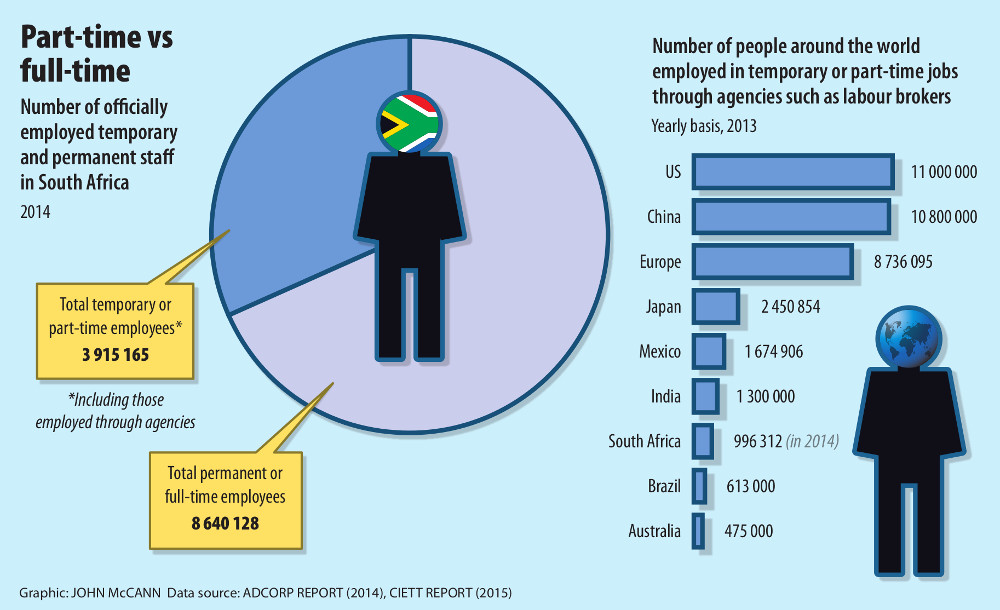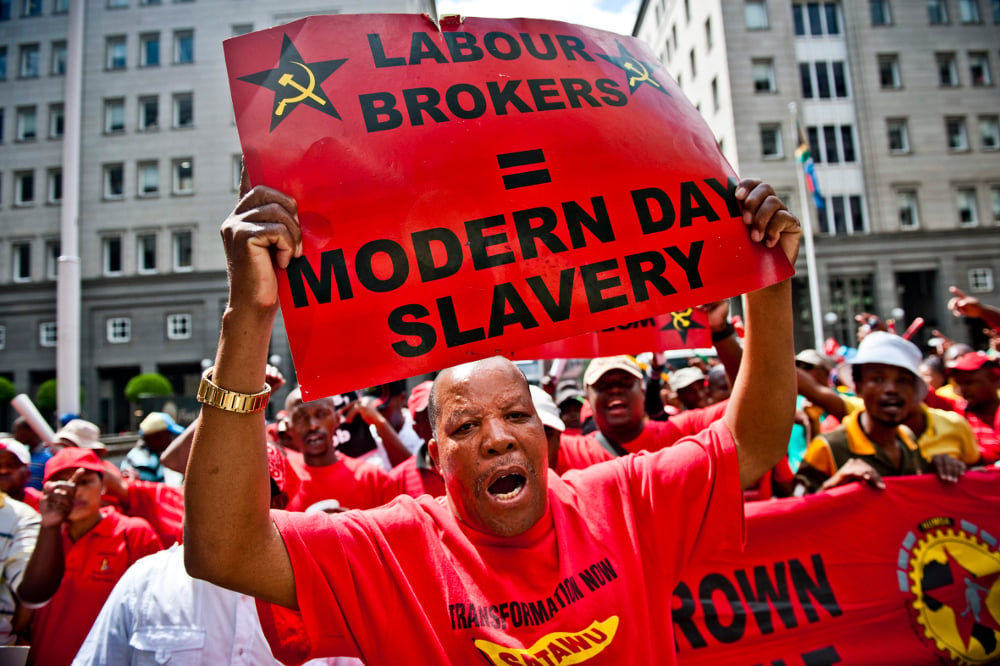A casual supermarket cashier is likely to earn less than her full-time counterparts and seldom receives benefits such as medical aid.
NEWS ANALYSIS
Nervously, she slides a till slip across the shop counter. Phone numbers are quickly exchanged. No words are spoken. As a casual worker, despite belonging to a union, she is constantly worried about losing her job and talking to a journalist could get her into trouble.
Jessica (not her real name) has been a retail worker for seven years. She earns R2 120 a month for working 30 hours a week.
She has no benefits: no medical aid, no annual leave. She is a nonpermanent worker or a “casual”, as she calls it. Such benefits and the opportunity to earn more money are the preserve of workers who are permanently employed, who earn up to twice as much as she does for working 40 hours a week.
She does not understand why, in the five years she has worked at the same company, she has not been made permanent. Nothing about her job is enjoyable.
“I work here because I’m suffering and I need to make ends meet,” she says by text message, afraid that a telephone conversation might be overheard by her employer.
She has two children, aged five and nine, and their father is a construction worker who earns little more than she does.
Her salary lasts for about 10 days of the month if she stretches it. After that it is over to the microlenders.
The truth is, Jessica will probably never become a permanent employee.
She is part of a process of casualisation described in the Oxford English Dictionary as “the transformation of a workforce from one employed chiefly on permanent contracts to one engaged on a short-term temporary basis”.
Hard-hitting trend
Globally, this trend is driving workers out of permanent work – away from higher wages and benefits, and out of unions.
Jessica is one of the increasingly shrinking pool of “casuals” who are unionised.
The retail sector, where Jessica works, is hard hit by the trend of employers cutting costs by hiring more workers on a contractual basis or through labour brokers. But the trend cuts across sectors, experts in the field say.
Casual workers are largely un-unionised. Cosatu identified the need to organise these “vulnerable” workers in research commissioned in 1997, and also subsequently.
Now, Cosatu says it still recognises the need to organise these workers but claims it is very difficult to do so, in part because of their sporadic movement across sectors. But labour analysts say casual workers are not unionised because they are increasingly rejecting formal unionisation. Observers say traditional modes of organisation are simply not compatible with current casualisation trends.
Dangerous job
Take the forestry sector as an example. The latest sectoral determinations for wages in the sector put the minimum wage for these workers at R2 420.41 a month. Yet the International Labour Organisation classified forestry work as the third most dangerous job after shipping and mining.
“To say there is widespread casualisation in the sector is an understatement,” says Wally Menne from Timberwatch, a voluntary alliance of South African nongovernmental organisations and individuals that “are concerned about reducing the cumulative negative impacts of industrial tree plantations on people and the environment”.
The organisation says the current policy among major paper and packaging manufacturers is to replace labour as far as possible through mechanisation. This is primarily for extracting timber, whereas the unwritten policy in the sector is to outsource plantation management.

“This has huge implications for increasing unemployment and poverty in timber production areas,” Menne says.
Research by forestry expert Jeanette Clerk, published in 2012, found that 82% of workers employed by large growers were casuals hired through labour brokers. Just 5% were fixed-term contract workers; the remaining 13% were permanent workers.
According to Clerk, contract workers and workers employed by labour brokers earn 61% of what their permanent counterparts earn for doing the same work.
Benefits
Recent legislative amendments are supposed to ensure that so-called “casual” workers receive the same benefits as permanent employees. But labour brokers are challenging the amendments and workers have yet to feel a change.
Steve Nhlapo, the head of collective bargaining at the National Union of Metalworkers of South Africa (Numsa), says that casual labour is inherently exploitative.
In the engineering sector, Nhlapo says, employers often promise workers new contracts at the end of their term, with the tacit implication that they will be out of work if they do not agree to renew their contracts. Some workers have been on contract for four years, he says.
Exploitation
Exploitation at the hands of labour brokers is also widespread, Nhlapo says.
“You find the primary employer is paying the labour broker R35 an hour for supplying the labour, which should be paid to the worker. But the labour broker is [also] taking R20 per worker, over and above what the primary employer pays them for their services,” he says.
“But the practice is actually harmful to employers because in the end it costs them more to use labour brokers.”
Besides the extra costs, labour brokers create a layer of distance between employer and employee that he believes allows for the exploitation of the worker.
“If you want productivity, you need a stable workforce,” Nhlapo says. “The longer the workers stay in their jobs, the more they understand the work. When workers are not skilled and experienced, industries cannot be competitive.”
Unionisation levels
Nhlapo says that, in most developed countries where industries are stable, there are higher levels of unionisation than in South Africa.
“In the auto industry, the worker will look at a car and tell you what’s wrong immediately because of their experience. Companies think they’re avoiding dealing with unions by using labour brokers, but instead they are dealing with individuals who do not know the labour law and who will take an unwinnable case to the CCMA [Commission for Conciliation, Mediation and Arbitration] and waste the company’s time.”
So why hasn’t labour broking been stopped? Cosatu has campaigned against it for years, demanding a complete ban.
A 2011 Cosatu statement said, whereas total employment had reportedly grown by 5.6% that year, casualised labour was increasing rapidly. “How can you say there is rigidity in the labour market when atypical jobs have risen by 64.1% and permanent ones declined by 20.9% in a decade?” former Cosatu spokesperson Patrick Craven said at the time.
Craven has since resigned, following the expulsion of the trade union federation’s former general secretary, Zwelinzima Vavi.
Cynical approach
Nhlapo, whose union, Numsa, was expelled from Cosatu, takes a cynical approach. “Look, you won’t succeed in a campaign against labour broking. Many people in Parliament have labour-broking companies,” he alleges, adding his voice to long-held beliefs that high-ranking ANC members are labour brokers.
But he says the breakaway faction led by Numsa could be good for workers.

Many casual workers believe that unions do not have their interests at heart, and turn to the much-maligned labour brokers. (Delwyn Verasamy, M&G)
“If Numsa and the seven [sympathetic] unions take labour broking seriously, Cosatu will be forced to take it seriously. I do not like competition in the way it is used by capital, but it might be a healthy thing for workers. Cosatu will be forced to put these things back on the table.”
Acting Cosatu spokesperson Norman Mampane says Cosatu is still intent on campaigning to ban labour broking.
Too late
But Jan Theron from the University of Cape Town’s Institute for Development and Labour Law has argued that demands for a complete ban on labour broking came 10 years too late and were naive.
“It [the demand for a ban] focused attention on only one way in which employment has been externalised. It was also not a demand labour could win, given the global context … coupled with the fact that South Africa is a constitutional state.
“Even if it had been possible to implement a ban, labour brokers would in all likelihood have been able to reinvent themselves as ‘services’, as some have already done, and carry out the same activity under another guise,” Theron wrote.
Igshaan Schroeder, co-ordinator of the Casual Workers’ Advice Office, says there is a gaping chasm between nonpermanent workers and unions.
“The first thing we have to tell workers when they come to us is that they are not ‘casual workers’,” he says. “They have the same rights as permanent workers, but they don’t know their rights. Psychologically, workers accept that they are casual.”
Amendments to various pieces of labour legislation are supposed to have ended the era of casualised labour, says Schroeder.
“But the opposite has happened. There’s been an explosion of this kind of labour across the sectors where it was rife, historically. And it is now happening across sectors.”
Day labourers
In the agriculture sector, a new development has occurred: workers often have no association with the land they are working on at all, and are brought in as day labourers.
Increasingly, day labourers don’t know which building site they are going to land up on. Workers are not connected to their employer and this makes it difficult for them to enforce their rights, says Schroeder.
This is also true for contract cleaning companies, which the CCMA ruled count as labour brokers, where workers remain “casual” for years.
“With the explosion of casual work, there’s a large proportion of immigrant work. They often don’t complain because they’re afraid of ending up at Lindela [repatriation centre],” Schroeder says.
Typically, the Casual Workers’ Advice Office finds that these nonpermanent workers are not given payslips.
“Sometimes they work Monday to Sunday, often more than 45 hours per week. They’re not entitled to basic leave. They don’t get annual leave. And they definitely don’t get paid minimum, sectoral wages. They don’t have job security. They’re not registered for unemployment insurance either, and all workers are entitled to this.”
Rooted in neoliberalism
This happens largely in the wholesale and retail sectors, “but it is by no means confined to them”.
The “explosion and generalised character” of the trend has its roots in neoliberalism, says Schroeder, with “flexible labour markets [being] a euphemism for cheap labour”.
Over time, this drags down the wages of other workers, Schroeder says, as employers can always threaten permanent workers with being replaced by contract workers.
Workers are far less likely to enforce their rights when their jobs are tacitly under threat. Thus there is a spiralling effect: workers, increasingly casualised, are not unionising.
“It’s very seldom that casuals are unionised,” he says. “Nonpermanent workers often tried to join the unions and the unions just didn’t take up the issues at all. By the time they get to us they are gatvol. They don’t want to hear about the unions.”
In one instance, 600 workers and crisps company Simba landed up in the labour court. “On the day their case came to court, the union didn’t even arrive.”
Union fees
Workers regularly ask Schroeder if they can claim back their union fees, and that this request has now become increasingly frequent.
“Often unions don’t want to organise labour broker workers, but the reasons are bureaucratic. For example, unions will say it’s too difficult to collect subscription fees. But unions ignore them – they don’t take up their issues.
“What I’ve seen is a vocal affirmation that they want nothing to do with unions.”
But why? Why would a worker, obviously vulnerable by virtue of his nonpermanent employment, want nothing to do with a union?
“The shop steward lot is no longer militant,” Schroeder says. “The shop steward is the most despised among the workers. They are accused of taking kickbacks on all kinds of things.
“They are not the voice of these workers. They’re the most aspirant. They want to be middle class. They’re not interested in these workers,” he says, explaining the perception that he believes exists among workers.